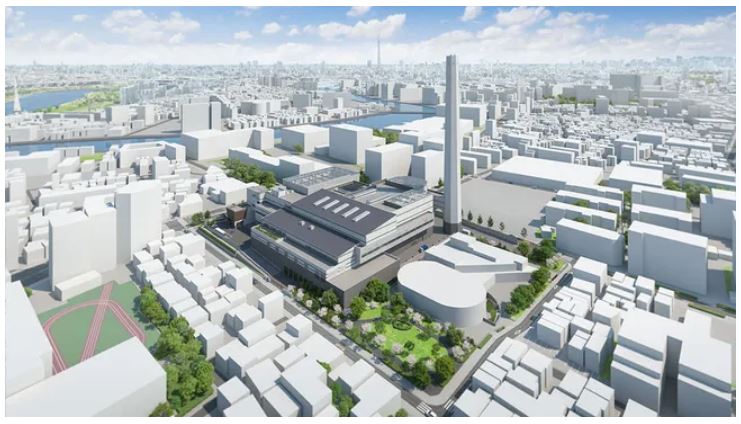Mitsubishi Heavy Industries Environmental & Chemical Engineering (MHIEC), a subsidiary of Mitsubishi Heavy Industries (MHI), has been awarded a contract by the Clean Authority of Tokyo to rebuild the Kita Incineration Plant located in the city’s Kita ward. The plant has been in operation since 1998 and has a capacity of 600 tons per day, but it has become outdated. The new facility is expected to be completed and handed over in February 2030.
The new Kita Incineration Plant will consist of two stoker incinerators, each capable of disposing of 300 tons of waste per day, and power generation equipment. The stokers are V-type stoker waste incinerators, developed exclusively by MHIEC, that have low loss on ignition, allowing for optimal drying and combustion processes compared to conventional stokers. This is the first time this system has been used in Japan. The plant will also feature high-efficiency power generation using the heat produced during incineration, and excess heat will be supplied to nearby city facilities.
The V-type stokers in the new plant have an optimized structure and incinerator shape with the stoker surface facing the center of the flame during the drying, combustion, and post-combustion processes. The design allows for efficient use of radiant heat as the waste is burned, helping to reduce the volume of waste and the proportion of unburned combustibles in the post-combustion ash. The environmental performance of this design was recognized with the receipt of the top “Ministry of Economy, Trade and Industry (METI) Minister’s Award” at the 48th Outstanding Environmental Systems Awards in July 2022, hosted by The Japan Society of Industrial Machinery Manufacturers (JSIM).
The tender for this project was conducted as a comprehensive evaluation, considering the technical aspects of the proposal and the cost. MHIEC’s proposal was chosen due to its use of an exterior design that reflects the history of the area and minimizes the oppressive feel of the building, a reduced environmental load from CO2 fixation through the appropriate use of lumber from the Tama area, and improved automated combustion control using sensing technologies and deep learning. The contract’s total tax-excluded value, including dismantling and removal of the existing structure and construction of the new facility, is approximately 55.2 billion yen ($417.7 million).
Image: MHIEC
